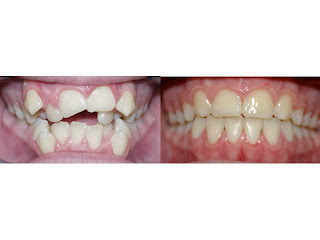Q. All the young children in the neighborhood
already are wearing “braces” and “retainers”, why should my child wait until he
is older?
A. Although there are some orthodontic problems
that should be corrected early (interceptive treatment) this in no guarantee
that future treatment will not be necessary when all of the permanent teeth
erupt at around age 12. Sometimes early
treatment just costs more and takes longer.
Recent studies have shown that for many patients, the final result of
two phase treatment is no better than waiting and doing a straightforward one
phase treatment. This is not to say that
parents should wait until all the baby teeth fall out before bringing in their
child for a consultation. Often there
are some timely and simple things we may recommend, and it is always better to
be a little early than to miss the appropriate time to treat.
Bottom line:
We like to think that, at Century Orthodontics, we are right where we should
be. Doing things when and if they are
needed…no more, no less!
